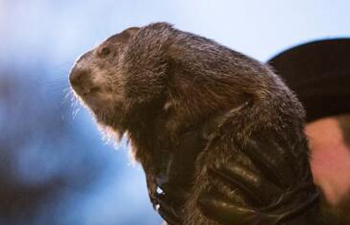NEW YORK, Feb. 6 (Xinhua) -- Chinese scientists' successful cloning of monkeys could eventually help the development of new drugs to treat human diseases, like brain and nervous system problems, a leading Chinese neuroscientist said.
At the end of 2017, a non-human primate research facility under the Beijing-based Chinese Academy of Sciences (CAS) produced two cloned macaques.
Allaying fears that cloning monkeys for research could ultimately lead to human cloning, Poo Muming, director of the Institute of Neuroscience at CAS, told Xinhua, "We have no intention to clone humans."
The macaque cloning was done for a humane reason, he said: "Because this is the species that will really help human health and cure human disease."
The cloning will reduce the use of large numbers of primates for research, especially in the West.
In 2016, the United States used over 71,000 primates for research or experimentation, according to the U.S. Department of Agriculture's animal and plant health inspection service.
U.S. pharmaceutical companies import at least 50,000 monkeys every year to test the efficacy of different drugs and determine safe doses for human clinical trials, Poo said.
"That is a huge number of monkeys used, which you should consider unethical," he said.
Since these monkeys have diverse genetic backgrounds, researchers must use a large number to make sure that the observed effects are due to treatment and not because of the genetic variation.
"Cloning is really the way to go," Poo said. "Because it reduces the interference (of) the diversity of genetic background on drug development. So it is for (that) ethical reason that we (have cloned) monkeys."
Darren Griffin, genetics professor at the University of Kent, holds the same view.
"If they can produce these cloned animals that means that you could use fewer animals for ... research, rather than the number being used at the moment," he said in a previous interview with Xinhua.
At present, the medical community mostly uses mice as a model to research cures for human diseases. But for many diseases, especially brain diseases, drugs that are developed using mice as model have failed clinical trials in humans, Poo said.
"Basically all big pharmas have given up developing neuro drugs," he said, citing two decades of drug development failure, with hundreds of billions of dollars spent on each drug.
"Next, we want to develop clones of animals that carry brain disorders," he said, especially degenerative or development diseases that have clear genetic causes.
Poo said he would like to focus on Alzheimer's, Parkinson's, autism and ALS, a nervous system disorder that causes disability.
Regarding the debate on the ethics of non-human primate cloning, he said every new technology is a two-edged sword: "There will be discussions and we'll see how the society deals with it."
In the 1970s, when genetic engineering technology first came out, he said everybody was worried about its harmful effect on humans.
"But so far, it has been 40 to 50 years and you don't see any real problem yet," he said.
"Cloned monkeys could be very valuable in studying specific aspects of human disease," said Tom Holder, director of Speaking of Research, an international organization that supports the use of animals in scientific labs.
"The breakthrough has shown that it is possible," Holder said in an emailed interview to Xinhua. "But it is too early to make any conclusions on whether the method will be able to be repeated efficiently and reliably."
Holder also said non-human primate research is subject to increased ethical and welfare considerations and is generally used only when other species are unsuitable for the research.













